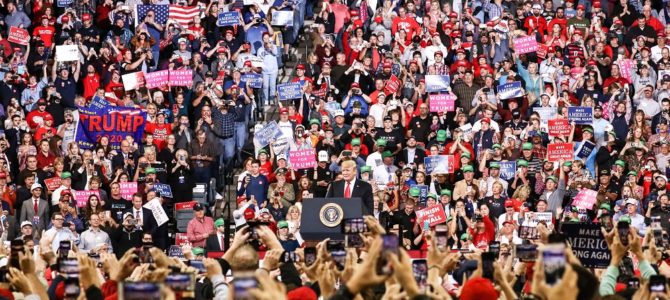
“The madness of Trump, as bad as it was, it really needed to happen. We really needed a reflection of our world’s greatest problem, which is not climate change, but sociopathy and narcissism. Especially in America. It’s going to kill the world. It’s not capitalism, it’s narcissism.” So said songstress Lana Del Rey, reflecting on the Trump administration this week.
She’s right to dig deeper than climate change and capitalism, but wrong to finger an incurable element of the human condition for America’s ills. The broader point, however, is important. Del Rey is arguing that Trump’s political ascent exposed or, perhaps, accelerated a cultural clash. She seems to be convinced this exposition will ultimately be constructive.
I’m not so sure. The problem is not that we’re all as narcissistic as Trump. The problem is that we’re all as anxious. Characterizing Trump as anxious may seem odd—and I’m certainly not invoking the psychological concept—but his central promise to “Make America Great Again” was predicated on a reasonable anxiety that the version of America he knew and loved was slipping away. That resonated immensely, and for some eminently fair reasons.
Where the anxieties of the working class and Baby Boomers were channeled into Trump, the anxieties of the left were channeled into a furious, culture-wide censorship campaign. Each vessel has profound issues made worse by their inevitable confrontation, which accelerated this painful culture clash in which we’re now engulfed. So why are we anxious?
While they’re a small fraction of the population, let’s begin by zooming in on the young men who populate the ranks of Antifa and even far-right groups like the Proud Boys. It seems in many ways that we’re harvesting the bitter fruit of a campaign Christina Hoff Sommers identified two decades ago in “The War Against Boys,” coping with a generation of alienated men now aging into their thirties and forties.
Much of what Sommers reported can ultimately be traced back to a thesis Mary Eberstadt persuasively advanced in “Primal Screams: How the Sexual Revolution Created Identity Politics.” That thesis is also in harmony with Tim Carney’s central argument in “Alienated America,” that “the death of the American Dream is a social phenomenon, not an economic one,” and that the decline of churches and other civic institutions has left a lot of Americans behind, desperate for authentic champions.
This is not to condense complicated problems into the arguments of a few books. It is, however, important to see Trump not as a function of narcissism or NAFTA, but as a very predictable manifestation of cultural upheaval rooted in the dramatic technological advancements that have changed everyday life quickly.
For instance, the left and the right agree that birth control pills, enabled by medical technology, were central to the sexual revolution. If you accept Eberstadt’s premise that the sexual revolution led directly to the rise of identity politics, the picture starts to become clearer.
Modern technology allowed us to move far away from home and stay superficially more connected than ever. It brought women into academia and the workforce at a rapid pace. That seems like old news now, but in the scope of human history it’s not.
Likewise, technology that now seems old created 24-hour news. It’s created more sedentary jobs and recreational activities, sucking us into screens for most of our days, leading to mental health and obesity epidemics. It’s put the sum total of human knowledge in our pockets, along with all of the other vast changes smartphones have induced in as little as a decade. What did we expect to happen?
Obesity, mental health, church attendance, tech addiction, and family structure play small roles in our political discourse, drowned out by politicians preening about job creation and coastal media members who can numb the pain with expensive childcare and pricey wine. But these trends have very immediate influences on our everyday lives, and are the root causes of the policy conversations that Washington at least pretends to be interested in.
The point of this ramble through modern history is simply to say Joe Biden cannot right the ship. No president can. Politicians can help, but we’ve fallen into a hole that will take years at best to dig out of. Legislation and policy can help, but this is much deeper than politics.









